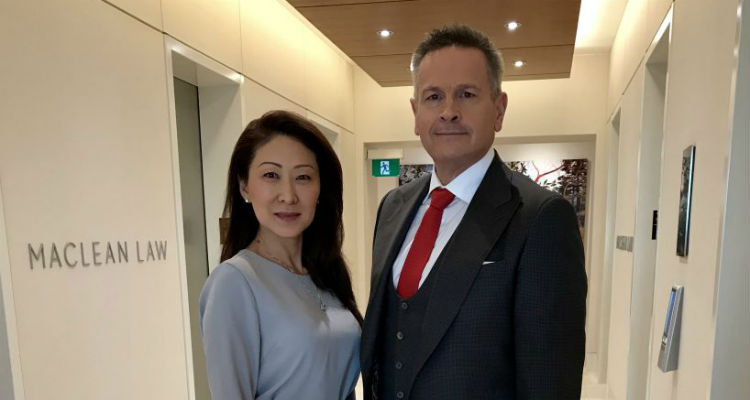
MacLean Law’s High Net Worth Mandarin Family Lawyers won Canadian Family Law Firm of The Year for 2024. Our winning High Net Worth Chinese Speaking Family Lawyers know in multimillion dollar and even in billion dollar Chinese speaking family law cases, that hundreds and often thousands of WeChat messages, real estate and company documents need to be translated from Chinese into English for trial and interim applications.
The costs for using a qualified certified interpreter are high. The best Mandarin speaking family law lawyers know that some interpreters are far better than others and translating phrases often requires interpretation and personal views of the interpreter. Many times we have dueling interpretations on our winning Mandarin Chinese speaking Family Lawyers cases. We know which interpreters are accurate and trusted by the courts.

高净值普通话家庭律师 中文热线:604 682 6466
In this blog founder Lorne N MacLean KC explains what courts require as a result of a recent case where a lawyer for one party translated documents but this was found to be improper and potentially biased. Fraser MacLean has a number of high net worth wins involving Chinese speaking clients with assets in Canada and overseas. His father founder Lorne N MacLean, KC has also won a number of leading high profile cases involving millions and billions of dollars of worldwide assets.
They know translations are a key part of winning High Net Worth Mandarin Family cases.
Vancouver High Net Worth Mandarin Family Lawyers 中文热线:604 682 6466

[43] Mr. Chan’s Affidavit 1 suffers from two problems.
[44] First, there is no statement in the affidavit which indicates that Mr. Chan is competent to translate a document from Chinese into English. While there is no reason to doubt Mr. Chan’s assertion at para. 2 of his Affidavit 1 that he is “fluent in both English and Chinese”, there is a material difference between fluency in speaking or reading a language, versus competency to translate a document. Nothing in Mr. Chan’s Affidavit 1 supports that he has the necessary competency to provide a reliable and accurate translation of the impugned statements.
[45] Second, even if I accept that Mr. Chan was competent to provide an accurate translation, he lacks the objectivity that is necessary for a reliable interpretation. Mr. Chan is the Plaintiff’s counsel. While he may be an officer of the Court, that is not sufficient to overcome the reasonable apprehension of bias that is created by his relationship to the Plaintiff.
[46] In Victoria and District Cricket Association v. West Coast Cricket Organization, 2024 BCSC 65, I noted the following in regards to the competing duties that a lawyer has to his client and to the court.
- a)A lawyer has a duty of loyalty to their client and is obliged to act in their client’s best interests: at para. 104, citing Canadian National Railway Co. v. McKercher LLP, 2013 SCC 39 at para. 19.
- b)The duty of loyalty includes a duty of commitment to the client’s cause throughout the action: at para. 108, citing v. Neil, 2002 SCC 70 at para. 19.
- c)The concern arises when there is a conflict of interest between a lawyer’s “obligation of objectivity and detachment, which are owed to the court, and his obligations to his client to present evidence in as favourable a light as possible”:at para. 110, citing Hazelwood v. Schlotter, 2022 ABKB 739 at para. 60.
高净值普通话家庭律师
[47] The translations themselves reveal how Mr. Chan may be conflicted by the duty to his client. At para. 4 of his Affidavit 1, Mr. Chan notes that the original posts that he has translated into English, “contain Chinese idioms” which he has interpreted rather than providing a “direct transliteration”. Idioms are groups of words that have a meaning which is not deductible from the individual words. It is not uncommon for people who all speak the same language to interpret a particular idiom in different ways. Given Mr. Chan’s duty of loyalty to his client, it is not a stretch to conclude that Mr. Chan’s interpretation of a Chinese idiom may have been done, consciously or unconsciously, in a way that provides a translation which is the most favourable to his client.
[48] It is also likely that Mr. Chan’s personal knowledge of this case has seeped into the translation, thereby rendering it unreliable. For example, Mr. Chan averred that he has used the word “fire” when interpreting the word “short” in the context of a sale; thereby proffering the translation “fire sale” rather than the alternative translation “short sale”. His decision to do that may have been impacted by the July 18, 2024, letter from Ms. Yan, where she uses the words “fire sale”. It is possible that an independent translator who did not have personal knowledge of the case may have preferred “short sale” as being a more accurate translation or may have even used different words to translate that particular portion of text. Given the difference between the meaning of a “fire sale” and a “short sale”, the decision of which words to use could have a material impact on the meaning of the text.
Best Vancouver Mandarin Chinese Speaking Family Lawyers 中文热线:604 682 6466
[49] Putting aside for a moment, concerns regarding its admissibility, Mr. Chan’s Affidavit 2 also reveals the danger that arises if his translation is admitted into evidence. Mr. Chan avers as follows:
- As stated in my first Affidavit, the posts contain various Chinese idioms, which I used quotations to indicate my interpretation, as opposed to a direct transliteration. As an example, the user name: “If someone infringes upon me, then I will return the favour tenfold!” could be interpreted differently as “If someone attacks me, then I will return the favour tenfold!” (my emphasis), but the meaning would be the same.
- The posts also contain various Chinese figures of speech, all of which I have translated to adhere to the original wording as closely as possible. In some instances, I used square brackets [ ] to further clarify the meaning from Chinese to English. For instance, at p. 18 of Mr. Ho’s affidavit, I use “that’s why they are short [fire] selling your project!!”. This is because a “fire sale” in English is figurative, as are the two Chinese characters that were used. The two Chinese characters are a term used in investment, and would be transliterated “to create emptiness”, but the meaning is “short selling”.
[emphasis in original]
[50] It is evident from the above that Mr. Chan has used a certain amount of discretion in deciding what words to use when translating a particular phrase – and that this discretion has been exercised based on his intimate knowledge of the case. Given the importance attached to words in a defamation proceeding, and the conflicting duties that Mr. Chan has to the court and to his client, I find that it would be dangerous to accept Mr. Chan’s translations into evidence in order to support the injunctive relief that is being sought.
[51] I have considered the prejudice to the Plaintiff in excluding the translations done by Mr. Chan. This must be weighed against the prejudice to the Defendant of granting an interlocutory injunction in a defamation proceeding where the threshold reliability of the translated words is seriously brought into question.
[52] Further, I find that any prejudice to the Plaintiff is his own creation. The Plaintiff chose to tender a translation prepared by his own lawyer, rather than obtaining an independent translation from a certified translator.
[53] Mr. Chan’s assertion in his Affidavit 2 that their law firm was not able to obtain certified translations in time for this hearing, is countered by the Ye Affidavit, which indicates that at least one qualified interpreter was available in the week leading up to the hearing, “to translate documents from Chinese to English on short notice with a 24-hour turnaround”. However, no-one from Plaintiff’s Counsel’s law firm contacted the translator.
[54] Further, even if I accept that there was insufficient time for the Plaintiff to get an independent translation prior to this hearing, this crisis was created solely by the Plaintiff. There was no reason why the Plaintiff could not have scheduled this hearing for the following week, which would have allowed him sufficient time to obtain a proper translation. After hearing the submissions of the parties and reading their materials, I am not swayed that there was the requisite degree of urgency to the matter such that it had to be brought on short notice.
[55] I return then to admissibility of Mr. Chan’s Affidavit 2. This affidavit was presented to the Court in the midst of Plaintiff’s counsel’s submissions. It was prepared to ostensibly address concerns raised by the Court as to weaknesses in the Plaintiff’s evidence such as:
- a)the lack of evidence as to the source of certain translations referred to by the Plaintiff in the Ho Affidavit – Mr. Chan now avers that the translations referred to in the Ho Affidavit were all done by Mr. Chan;
- b)the lack of evidence as to why a certified translation was not obtained – Mr. Chan now avers that they were not able to obtain certified translations in time due to the “urgent nature of this matter”; and
- c)concerns about the translation of certain words and phrases – see Chan Affidavit 2 at paras. 7 and 8 (excerpted at para. 49 above), which attempts to explain away the concerns.
[56] The Chan Affidavit 2 was tendered contrary to the direction of the Court that no further affidavit material should be filed by the Plaintiff. Nevertheless, the Defendant’s Counsel does not object to its admissibility insofar as the affidavit is used to assert that all of the translations that Mr. Ho relies on were done by Mr. Chan, or that translation of certain idioms or figures of speech can be challenging. I will admit the Chan Affidavit 2 for those limited purposes. To the extent that the Chan Affidavit 2 is relied on by the Plaintiff’s Counsel for other purposes, I find that it is inadmissible as it was filed late in the proceeding, against the express direction of the Court, and without giving the Defendant’s Counsel any time to properly respond.
[57] I turn finally to the Ho Affidavit. The objectionable portion of that affidavit is as follows:
- I understand that Tommy M. Chan, who like myself, is fluent in English and Chinese, prepared the Chinese to English translations in Exhibits D, I, L, M, and O, which I have reviewed and confirm they are true and accurate to the best of my knowledge. I acknowledge that those translations are not certified, but am still relying on those translations given the urgent nature of this matter. Amber will obtain certified translations of the Chinese publications as soon as practicable.
[58] Mr. Ho’s “verification” as to the accuracy of the translations prepared by Mr. Chan, suffers from the same problem as Mr. Chan’s assertions. They are inherently unreliable given that they are made by the Plaintiff in this defamation proceeding.
[59] In summary, I am not satisfied that the translator of the impugned statements is: (a) unbiased, objective and impartial; and (b) competent to translate the impugned documents from the Chinese language to the English language.
[60] As such, I conclude that all of the Chinese to English translations which are attached to the Chan Affidavits 1 and 2, and the Ho Affidavit, fail to meet the threshold test for admissibility. Consequently, these translations are inadmissible.
High Net Worth Chinese Family Lawyers

最佳高净值普通话家庭律师 need to ensure the evidence from foreign language documents and of witnesses in affidavits and on the witness stand at trial are accurately and fairly interpreted.
Cultural differences play a huge part in our Best Vancouver Mandarin Chinese Speaking Family Lawyers cases and we need to ensure judges are educated. 最佳高净值普通话家庭律师








